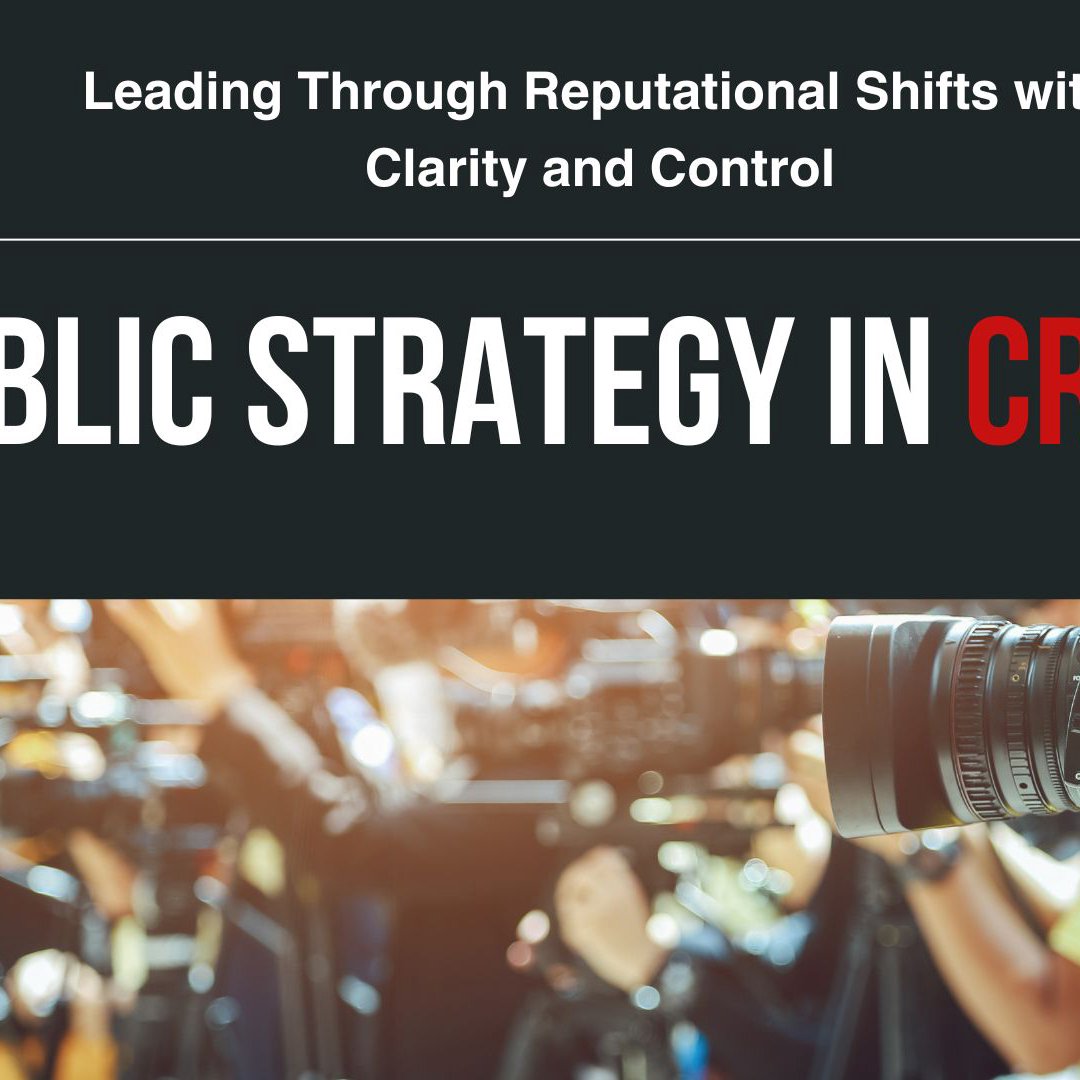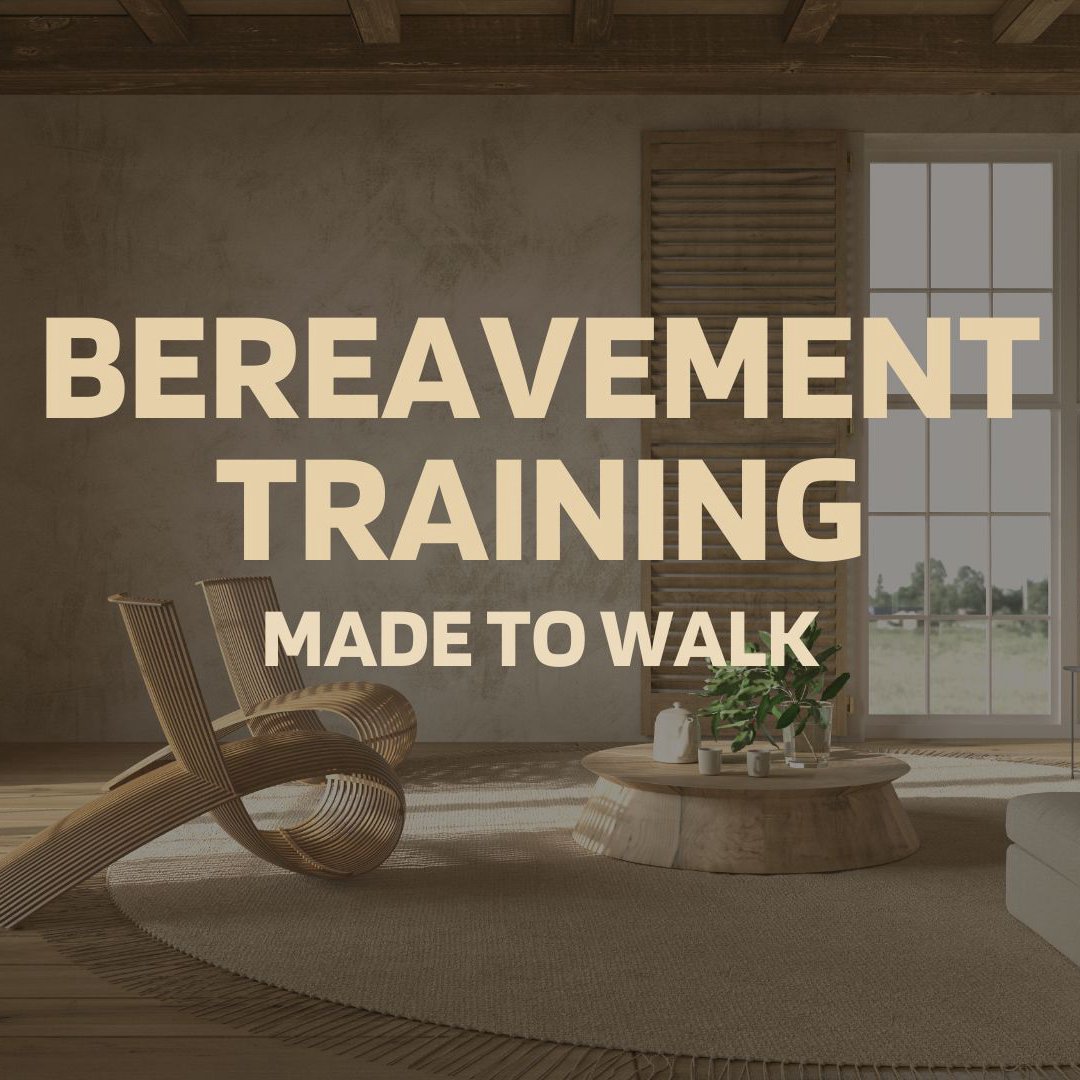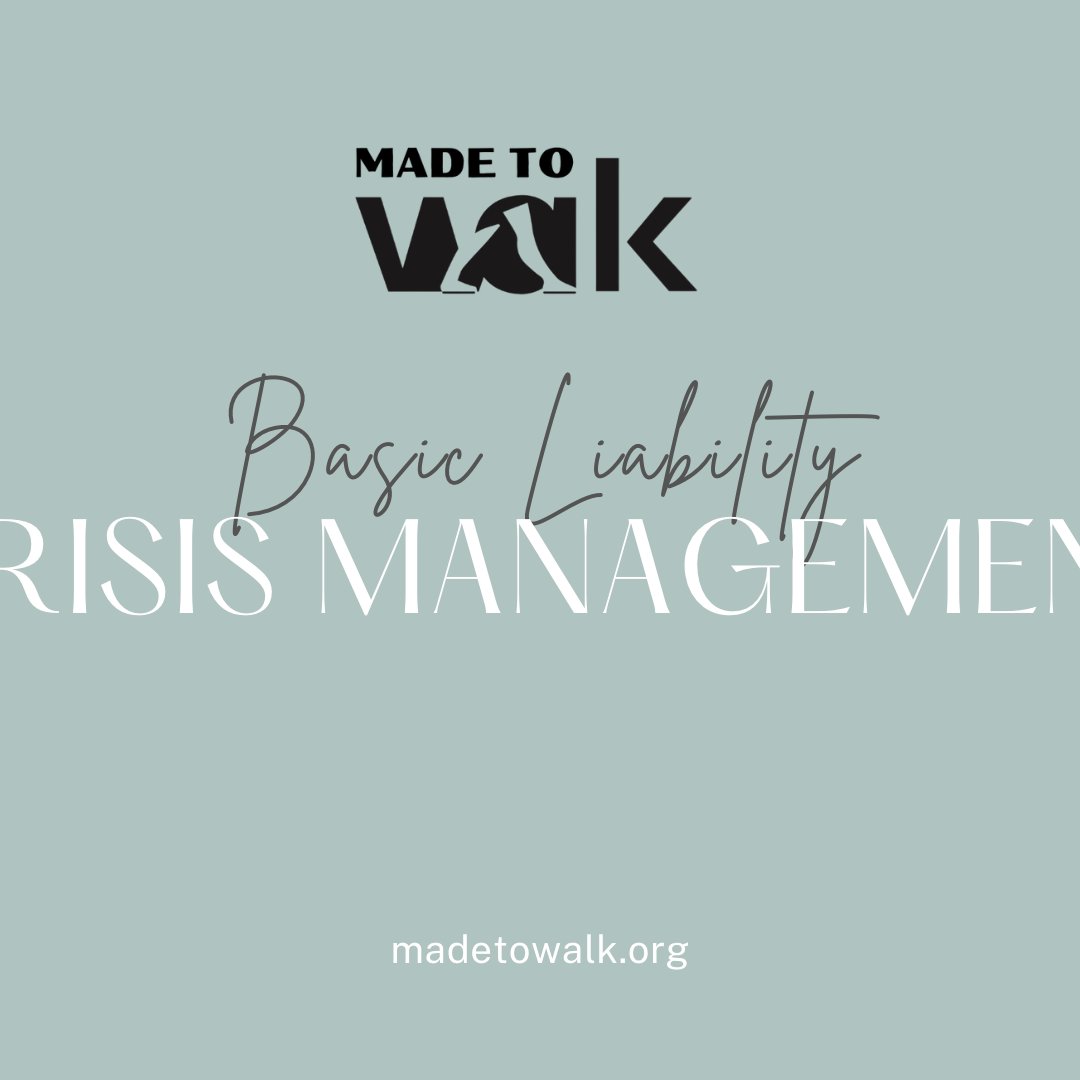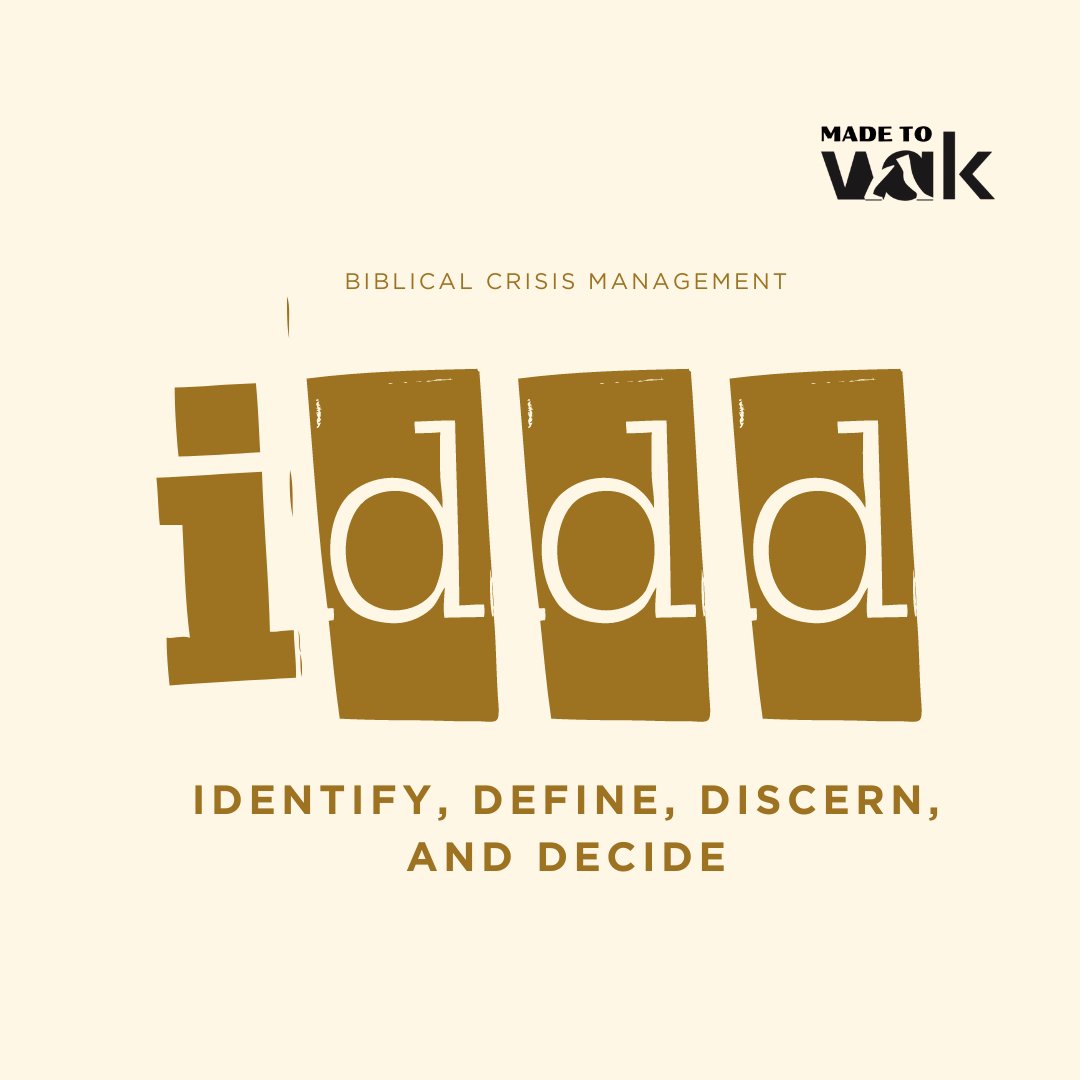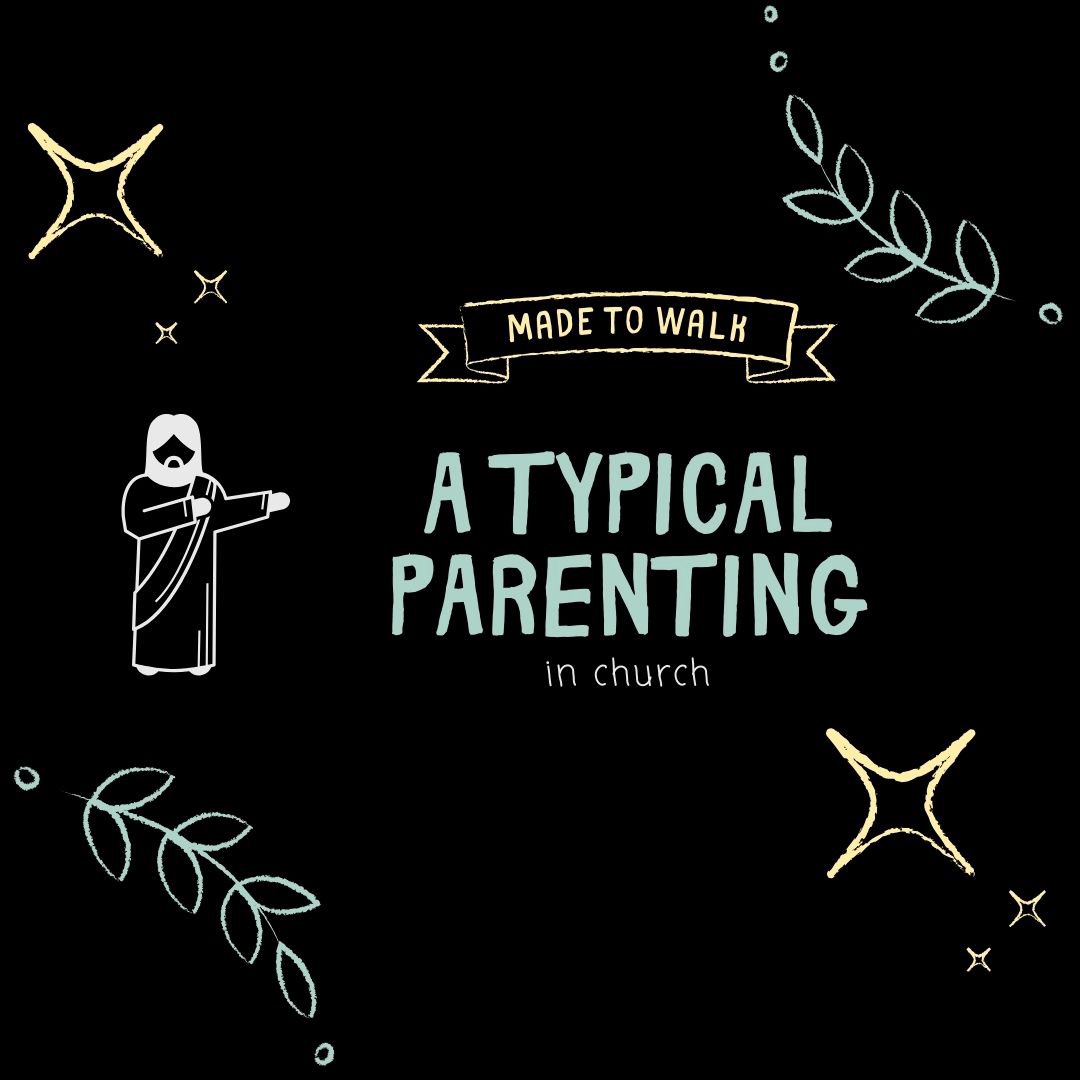Discover Made To Walk: Biblical Crisis Communication
Made To Walk: Biblical Crisis Communication

Made To Walk: Biblical Crisis Communication
Author: Izzy Gentry
Subscribed: 0Played: 6Subscribe
Share
© 2026 Made To Walk
Description
Join us as we tackle today's most challenging cultural conversations. Whether you're a parent, volunteer, leader, or friend, we'll guide you on how to approach difficult topics with confidence and compassion. It’s easy to feel unprepared, but with these practical insights, you’ll gain the tools to lead and disciple in a way that fosters lasting healing and growth. Our goal is to help you move beyond quick fixes and work toward meaningful, long-term impact. Thank you for your commitment to deepening your discipleship and making a real difference.
31 Episodes
Reverse
Every thriving ministry needs more than passion — it needs a plan. In this Made To Walk training, we explore how to create a ministry strategy that builds clear pathways for salvation, discipleship, and leadership — ensuring that no one gets spiritually “stuck” or burned out.Learn how to: ✅ Develop resources and opportunities that help people take their next step. ✅ Create systems that lead to lasting spiritual growth, not just busy schedules. ✅ Prevent burnout and backsliding by helping your team grow individually. ✅ Build a ministry that equips, empowers, and multiplies leaders.This training helps you turn your mission into movement and your calling into clear strategy. Let’s build ministries that grow deeper, not just bigger — and give people paths for life-changing growth with no dead ends.
Learn how to brand your ministry with clarity, purpose, and impact. In this short training, we break down how to connect your mission to your message — and your message to the people who need it most. 🎯 Build trust. 💡 Strengthen your voice. 🌍 Expand your reach.
When leadership faces crisis — from public fallout to internal division — what matters most isn’t the mistake, it’s the response.This training for executive directors, board members, and public leaders breaks down how to navigate legal, ethical, and reputational challenges with wisdom, strategy, and composure.✅ Learn how to: • Respond to “falls from grace” with integrity • Align legal and communication strategies • Rebuild trust through transparency and accountability • Lead your organization from reaction to reformGrounded in data, leadership principles, and Scripture — “For by wise guidance you can wage your war…” (Proverbs 24:6).
In times of crisis, how we respond matters just as much as what we say.This video dives into the essentials of trauma-informed communication and volunteer counseling training — equipping leaders, pastors, and community responders to bring calm, clarity, and care into moments of chaos.You’ll learn: ✅ The difference between acute, chronic, and complex trauma ✅ How trauma impacts communication and decision-making ✅ The foundations of Psychological First Aid (PFA) ✅ How volunteers can provide care without causing re-traumatization ✅ Key strategies to recognize distress, stabilize emotions, and connect people to helpWhether you serve in a church, nonprofit, or community organization, this training will help you respond well — not just react fast.🧠 Remember: Presence before process. Safety before solutions.📘 For more resources or to book a trauma communication workshop, visit: 👉 www.madetowalk.org
In a world that feels one headline away from the next crisis, how we prepare determines how we respond. A Crisis Management Plan is more than a binder on a shelf—it’s a living framework that guides our actions when emotions are high, facts are fuzzy, and decisions carry real human impact. But to be truly effective, that plan must be rooted in ethics.
The Importance of House of Worship Security: Seeing with Compassion and AwarenessIn a world where uncertainty can strike without warning, one of the most sacred responsibilities we hold as leaders, pastors, and volunteers is protecting the safety and peace of our worship spaces. A house of worship is not only a sanctuary for prayer—it’s a refuge for the broken, the searching, and the redeemed. That means security isn’t about fear; it’s about stewardship.
Loss is never easy—and walking with others through it can feel even harder.Our Bereavement Training is designed for pastors, ministry staff, and volunteers to equip you with the tools to support others through grief with compassion, care, and clarity. 💬💛In this session, we cover: 📍 Understanding the stages of grief 📍 How to offer support without pressure 📍 What to say (and what not to say) 📍 Church & HR protocols for loss in the workplace 📍 Self-care for those doing the caringGrief is not a moment—it’s a journey. Let’s walk it together, better equipped and better supported.
Survivor’s Guilt: Releasing the Shame, Redefining HealingSurvivor’s guilt is a silent burden many carry after living through a traumatic experience. Whether it's a natural disaster, war, illness, or the tragic loss of others, surviving can bring not only relief—but also confusion, shame, and guilt. These feelings can be hard to name, even harder to confront. But the first step toward healing is understanding that these emotional responses, while valid, are not permanent. They are signals, not sentences.The Hidden Faces of Shame and GuiltShame and guilt don't always appear in obvious ways. Many who suffer from survivor’s guilt don’t label their emotions as such. Instead, they may experience anxiety, numbness, or a persistent sense of unworthiness. This confusion is especially common when the source of the guilt is something positive—like simply surviving.The truth is, no two people experience trauma in the same way, even if they went through the same event. This makes healing deeply personal and often misunderstood. A person may not even realize they’re stuck in a cycle of guilt until it begins to erode their ability to stay present or move forward.Time Alone Doesn’t Heal—Forgiveness DoesThere’s a popular saying: time heals all wounds. But when it comes to trauma and survivor’s guilt, time alone is not enough. Unprocessed shame can fester beneath the surface. What actually fosters healing is forgiveness—not just of others, but of oneself. It means choosing to release the mind from the exhausting grip of what ifs and should haves.Let Go of the Need to “Fix” ShameOne of the most dangerous traps is trying to fix shame. We think that if we just revisit the memory enough times, punish ourselves long enough, or make enough sacrifices, we’ll eventually feel better. But shame doesn’t resolve through self-punishment—it deepens. Instead of healing, it creates a painful loop of guilt and regret.This is where biblical stories, such as those found in Genesis 9 and 19, offer insight. These are stories of survival—and shame. In both, individuals attempt to resolve their survivor’s guilt through decisions that lead to deeper consequences. These narratives show us that trying to escape guilt without understanding it first often creates more harm than healing.Practical Tools for Releasing Survivor’s Guilt1. Identify What You're Really Feeling Ask yourself: is this shame, or is it fear? Is it guilt, or is it anxiety? Emotions are layered and complex, and naming them is a powerful step toward reclaiming control.2. Know Your Triggers Track the situations, thoughts, or environments that bring the shame rushing back. When you understand your triggers, you can start developing healthy coping strategies rather than reacting on impulse.3. Work With a Grounded Advocate or Therapist Healing is not meant to be done in isolation. A grounded therapist or support system helps you form a plan with purposeful goals. They provide the tools and perspective necessary to move forward without being consumed by the past.4. Stay Present, Not in the Past Revisiting old wounds, especially when done impulsively or alone, often leads to more pain. Before you go there, ask: What is the goal of this reflection? If the goal is unclear or emotionally reactive, it’s time to pause and ground yourself.5. Accept Without Fixing Acceptance doesn't mean approval of what happened. It means releasing the urge to fix something that's not broken—your survival. Your life is not a mistake. You are allowed to be here.Final Thoughts: Release the CycleThe path to healing isn’t about erasing the past; it’s about changing your relationship to it. Survivor’s guilt may knock at your door, but you don’t have to answer alone—or at all. Release yourself from the urge to revisit the pain without a purpose. You are not here to carry everyone’s sorrow. You are here to live.
Understanding Secondary Trauma: A Hidden ChallengeIn our interconnected world, the effects of trauma are not confined to those who experience it directly. Secondary trauma, also known as vicarious trauma or compassion fatigue, can significantly impact those who support or are closely involved with trauma survivors. This phenomenon, while less visible, is an important area of concern for caregivers, first responders, mental health professionals, and even those who offer emotional support to friends and family in distress.What is Secondary Trauma?Secondary trauma occurs when an individual, through their exposure to others’ traumatic experiences, develops symptoms similar to those of post-traumatic stress disorder (PTSD). This can manifest in various ways, including emotional exhaustion, intrusive thoughts, and feelings of helplessness or irritability. Unlike primary trauma, which involves direct exposure to a traumatic event, secondary trauma results from indirect exposure, often through listening to or witnessing the trauma experienced by others.Symptoms and ImpactThe symptoms of secondary trauma can closely resemble those of PTSD and may include:Intrusive Thoughts: Recurrent, distressing thoughts about the trauma experienced by others.Emotional Numbness: Difficulty feeling emotions or experiencing a sense of detachment from others.Hypervigilance: Increased anxiety and heightened alertness to potential threats.Avoidance: Steering clear of situations, conversations, or reminders associated with the trauma.Exhaustion: Emotional and physical fatigue that can affect one’s ability to perform daily tasks and responsibilities.These symptoms can impact personal relationships, job performance, and overall quality of life. Over time, secondary trauma can lead to burnout, depression, and a diminished capacity to effectively support others.Who is at Risk?Certain individuals are more susceptible to secondary trauma, including:Healthcare Professionals: Doctors, nurses, and therapists who regularly work with trauma survivors.First Responders: Police officers, firefighters, and emergency medical personnel who encounter traumatic situations on the job.Social Workers: Professionals who assist individuals and families in crisis situations.Family and Friends: Loved ones who offer support to individuals dealing with trauma.Volunteers: People involved in crisis response or advocacy work.Strategies for Coping and PreventionAddressing secondary trauma involves proactive self-care and support strategies. Here are some effective approaches:Self-Care: Engage in regular self-care practices, including exercise, hobbies, and relaxation techniques to maintain emotional and physical well-being.Boundaries: Set clear boundaries to separate professional responsibilities from personal life. Learn to say no when necessary and avoid overextending yourself.Supervision and Support: Seek regular supervision or consultation to process your experiences and emotions. Peer support groups and professional counseling can also provide valuable outlets.Education: Stay informed about the signs and symptoms of secondary trauma. Understanding what you’re experiencing can help in recognizing and addressing it early.Mindfulness and Stress Reduction: Practice mindfulness, meditation, or other stress-reduction techniques to manage anxiety and maintain emotional balance.Work-Life Balance: Prioritize a healthy balance between work and personal life to prevent burnout. Ensure you have time to disconnect and recharge.Seeking HelpIf you or someone you know is struggling with secondary trauma, seeking help is crucial. Mental health professionals can provide support and strategies tailored to individual needs. Don’t hesitate to reach out for assistance—addressing secondary trauma is a vital step in ensuring the well-being of those who dedicate their lives to helping others.ConclusionSecondary trauma is a serious issue that affects many individuals who are exposed to the suffering of others. Recognizing the signs and implementing effective coping strategies can help manage its impact and maintain overall well-being. By addressing secondary trauma with compassion and proactive measures, we can better support those who are on the front lines of trauma recovery and ensure they receive the care they need.Remember, taking care of yourself is not just beneficial for you—it enhances your ability to support and care for others effectively.
Being in the crisis management industry for over a decade often has its benefits in handling hard issues. However, the one thing I often forget is that not everyone knows the basic liability concerns covered within liability insurance. Knowing your weaknesses can only strengthen your body.Let's jump right in because there is a lot to cover.Mobility:-Mobility is not isolated to transportation If you plan to meet in a different room, building, or location make sure to over-communicate. Nothing is more alarming than a frantic parent who alarms other parents about not knowing where their child is. -Forms Protect You/ Communication Protects Families It does not matter if you plan to drive 10 seconds or 10 hours you must have disclosure and liability waivers. Communicate arrivals/departures and give multiple contacts in case you are tied up and can't answer a parent.-Give yourself a 10-business-day rule if you don’t have 10 days you shouldn’t be doing the event. Harmful liability usually occurs out of "lack of time." Always Pre-mortem think about all matters that could go wrong and plan accordingly. -Never Assume. Just because it sounds like common sense does not mean that attendees will be able to process accordingly. Be as specific as possible using a Sherlock Holmes level of detail and instruction sharing.Media:-Live Stream is still media (post signs visible at exit and entrances.) Not everyone knows your services are live-streamed or recorded. Make sure you give appropriate (courtesy) awareness. Even if you are in a single-party consent state it is better to be transparent. -Photography / Videography Never use personal phones always use a designated phone or media flash drive that stays on-premise. This is important because there could be crises, child photos, or evidence that needs to be secured. If it is on a personal device or leaves the premises it can no longer be "without a doubt" protected from tampering or unauthorized use. -Drones/ Surveillance/ Audio Files: Know your state laws when using particular media. Drones should take into consideration any private properties in their shots, this could be a felony.[Government Code Section 423.003 makes it an offense to use a UAV to record a person or privately owned property with the intent to conduct surveillance. If you capture an image with intent to conduct surveillance and your activity is not exempted under the law, you could face a Class C Misdemeanor offense]Know if your state is a one-party recording state. Know that in all areas you record on surveillance you also are accountable for even if you "missed" noticing a concern.Family Engagement:-At-Will Engagement VS Surrender Engagement. Liability for injury, while parents are responsible, will fault to negligence of the parent unless of lack of signage in an unsafe environment. So again never skip the signage.-Signage Is Life -Indoor VS Outdoor: Read your liability to be very sure of the protection of external (parking lot) liability as well as events off-premise. Sometimes events call for separate liability insurance.-Medical Care and Access: Make sure you have first aid kits easily accessible. make sure fire extinguishers are visible and lit.-Access To Hydration: If you are having any event outdoors or with physical activity have water accessible. Even if it is an ACTIVE water fountain. Even if you tell parents to send a water bottle have a case on hand. -When In Doubt Always Report: Better to be safe and have a higher-up acknowledge a concern at an event. These could be signs of trafficking or abuse that need mandatory reporting.On Location Signage/ Doors-Even If You See No One It’s Never Worth The Risk. Whether it is a wet floor, a faulty piece of equipment or a storage room use signage. Document the day it was put up and photograph it.-Lock All Doors That Are Not Necessary To Be Opened -Set Access Alerts -Log Keys and Doors Opened -Place No Access SignsPublic WI-FI:Your Crisis Management plan should include protection for cyber security.-Isolate IoT devices these would be your thermostats, security cameras, and smart TVs, separated from your main network -Configure the guest Wi-Fi separated subnet (segregated) and use WPA2, (this is a security protocol that uses encryption to secure networks.) -For large groups of guests who need wireless access, create a user login portal. -Specify your bandwidth limitations and policies by individual user or group. Give very little bandwidth per user account. There should only be enough bandwidth for email, this is more than sufficient. -Invest in a separate router for guest Wi-Fi access.Mandatory Reporting: Times to call 911 and any available NGO's who can assist on-site. Build relationships with NGO's.THREAT-To Bodily Harm-Including SelfAcknowledge: PTSD/VeteranINJURY-Physical AbuseMany states provide an exception to the definition of medical neglect for parents who choose not to seek medical care for their children due to religious beliefs.NEGLECTNon-Visibal-SUBSTANCE ABUSE: Pregnant moms on substances, children with access to substances, parents using kids for access to medications, etc.SEXUAL ABUSE: Change in behavior or a disclosureEMOTIONAL ABUSE: Change in behavior or disclosureHUMAN TRAFFICKING: Referring to an individual as Master etc, carrying large amounts of cash, a boyfriend who carries her wallet/phone/personal belongings, personal high-end gifts that seem out of character.Social Media and Gaming:-NO ACCESS on trips and overnight stays: there are privacy issues for other families' children as well as the individual. Also, a child being trafficked or abused will not be able to adapt well without a phone. It can be a good test for cause of concern.-Shared Locations: students can share locations with unwanted guests, buyers, or transportation -Unplanned Visitors: Never assume you know a child's lifestyle or make assumptions based on the family identity -Never should Volunteers/Leaders be “chatting” with students directly (Document Appointments)
As a strategist, I have worked with many political teams across our great nation. I often find that regardless of State or City the problems look and sound the same. I deal with crisis management so I am going to focus on in-party conflict.When we do not anticipate conflict we will react instead of respond.We have to be focused on finding solutions not expressing feelings. Being active listeners will be how we find the common ground. Often we see the world closer in reach than we think we do. Meetings: Sometimes it takes some uncomfortable conversations that result in good work being done. Sometimes keeping the peace can result in rules being violated, investigations and conflict being much more combative than if a person had raised a concern to begin with.Lateral Engagement: Look at the leadership that is adjacent to you. Don't manuever with higher ambitions motivating you and don't move as a dictator would to speak lower to those under you. Find common leadership so that delegation is a partnership. The GOP Data Center: Find ways to access your precincts database and be a part of the groundwork that gets people registered, excited and engaged. Gratitude: Always look over to those who seek to go above and beyond. We are quick to complain but often leave out the gratitude we have for our fellow workers.Concrete: Please keep your arguments to concrete facts. Bring out a chapter and verse to back your arguments and if you do not have one hold your statement until you do. Use your by-laws, constitution, SREC Rules, and platform to help construct your arguments.Inspire One ANother- Your work should be with personal motives in check. Make sure you are doing things for your community as well as yourself not just for your own benefit. When we want to connect:Listen without intent to respond Only respond to what someone has saidMirror what others have saidThe 5 rules for constructive communication:Do not use blame, criticism, accusation, punishment or humiliationDecide in advance what you want to accomplishSay only what you need to say, nothing elseDon’t ask questions that don’t have actual answersAlways be ready to stop when things get too heatedStay away from subjective arguments:Play your arguments out loud. Steer away from arguments that are broad or emotional. Be specific and clear.To go over social moral codes review the Podcast Video listed to this blog for the full breakdown and sample arguments.
There are many questions that surround the topic of trafficking.Is it really happening in the United States?Can it actually happen in our town?The reality is that trafficking has evolved from what we once thought it to cinematically be.The phone is the new white van. There is a very long dedicated and well-planned process that goes into the world of trafficking.LuringGroomingIsolationManipulation CoercionInto ExploitationToday the most common approach is to find a young person online, who shares too much personal information and creates a false sense of connection. There are many times the grooming process can go for months even years before they convince a young individual to run away. They often persuade them in the Romeo philosophy to run away with a long-lost love only to realize the shift comes quickly.The process of grooming includes gifting, love bombing and behavior manipulation. You can find that these young people connect through false coercion and then slowly are isolated away from food and resources for survival.Those most at risk include pretty much anyone who is longing for community or a common behavior. These include attention, sensory, escape, counter-control or access. Often times most at-risk will include individuals living in fatherless homes, single-parent homes, special needs, CPS children, foster children, etc.Adverse childhood trauma can be a precursor to being at risk. Often an individual who has experienced trauma wears physical attributes noticeable to predators. These could be lack of eye contact, shrugged shoulders, pulling at sleeves over wrists and so forth. Identifying trafficking can include a sudden behavior change, a possessive "boyfriend" that carries an individual's personal items, sudden isolation or withdrawal. Behaviors are not congruent with socioeconomic levels. This could include a low-income individual suddenly carrying a Louis Vuitton or a stack of cash. Look for branding or tattoos that contain numbers. These numbers could identify pimp rules.In the video training, I go over terminology and further identifiers to look for. This a great first introduction to trafficking as a whole. For further details please request any specific content at madetowalk.org
IDENTIFY, DEFINE, DISCERN, AND DECIDEWe often get asked how we train our kids to not become victims of child exploitation and trafficking.Our main purpose is to train to avoid or respond to crises.The bigger emphasis is "Where in the Bible are we given a training guide."Let's take a look together at these 4 simple and easy-to-remember steps using a Made To Walk presentation called IDDD (known as a kids ID)The main reason for us focusing on "Identity" is because self-worth and identity are common weaknesses for traffickers/predators. We need to know how to identify shifts in our kid's behavior. Sometimes kids notice it in a friend faster than an adult notices it in a child. Below is a helpful way to approach this conversation.When a child's identity is being a representation of God above even their parents, Church, or community their standards for themselves are higher. Sometimes making mom and dad proud doesn't matter to them but disappointing God will. But how do we address this without getting an eye roll or a sarcastic statement? We can't teach our kids to never fall off a surfboard. We can only teach them how not to drown when they do. So teaching kids how to manage a crisis will help them be successful. They realistically are just not always going to run to mom and dad. Bringing kids into a conversation with you as opposed to speaking to them is all the difference. Identify:Be not wise in your own eyes; fear the Lord, and turn away from evil. Proverbs 3:7Teaching them to not take actions that make them unwise is an effective approach. Kids want to be perceived as smarter than a "child" so let them have access to the truth that makes them wiser. 1 Peter 5:8-9“Be sober, be vigilant; because your adversary the devil walks about like a roaring lion, seeking whom he DEVOUR. Resist him, steadfast in the faith, knowing that the same sufferings are experienced by your brotherhood in the world."Let them know that as part of the identity that comes with being a high-profile child of God, some want to seek out and destroy their reputation. They want to taint and steal the years of youth/innocence/ignorance. Let them know they need to be on high alert. Mom and Dad aren't always going to be there to wield the shield and sword for them. In Identify, we teach kids to Identify attributes that are Godly and the ones that are not. That is how they will know when they are in a situation that doesn't "feel" right. They can notice negative attributes in friends as well. Using a lesson about looking out for their friends is easier to swallow than a don't do this lecture. Define:Teaching kids how to define a threat from a friendly acquaintance is key. Often it is not as noticeable as you may think. A predator is committed to grooming a person for as long as necessary to build trust. Often it takes months even years before a conversation ever turns inappropriate. By the time they are asked to do anything "wrong," they are so connected to the individual through trust that they just do it. Teach kids to test even people who use kind words, sweet talk or even faith-based conversations. They need to know what behaviors are faith-based in moral and which form harmful consequences.Test The SpiritBeloved, do not believe every spirit, but test the spirits to see whether they are from God, for many false prophets have gone out into the world. 1 John 4:1DiscernOnce a child is aware something does not feel right they need to determine what to do with the information.I often use the example if you cut off your arm would you go to Instagram to ask for advice or if you need a new hair style would you go to pharmacists to get a new hair cut, the answer is no. There are experts in their field who need to work with individuals on concerns of the heart, head, and body.I use the example of Biblical Training Camp:Training Camp ToolsIdentify your weaknesses and strengthen them (heart, head, body etc) If they have an insecurity of your body that is a body issue, if they feel not smart enough that is a head issue, if they feel abandoned that is a heart issue. If we do not focus on the core root of these issues and build up a child they become "at-risk" meaning more likely to be targeted. Protect your house (barricade entrances and exits) - This is in reference to phones. I tell kids if you are sharing your location with the whole school you are leaving all your entrances unlocked with no safe exits. If you are sending unsafe content you are not protecting yourself (temple.)Know experts in the field to triage. Again see someone to help you strengthen your weaknesses.Be vigilant. Don't be constantly distracted that you miss the threats around you.Be aware of changes. This is for yourself and others you care about.There are never mistakes only choices and better choices. There’s always room to pivot your plan. Remind kids no matter how far they have gone it's never too scary to turn around and speak up. It is far scarier to reach the consequences that leave scars.Wounds heal but scars stay. Keep your friends 6. Look out for behavior changes amongst kids at school and know how to approach them safely or tell an adult. Decide to use God's ArmorEph 6:10-18Memorizing this is vital to the process of making a successful preventative and proactive impact on youth.Worldview is vital to the success of kids making a pivot or a life choice.
Today we have a large diversity of NGO work available to non-profit Churches. Many times movies portray an individual as feeling abundantly grateful to be rescued. Unfortunately, there is often so much complexity to a victim's reality it can be hard to see any impact.Advocacy is about standing alongside an individual as they make small impacts in their lives. What may not feel like any movement at all can be small tiny victories from one day to the next. Maybe they went through the first day in a long time not getting hit or they ate food for the first time they had never been allowed to eat. We don't know exactly every small milestone we get to witness but this video will help guide you in your expectations so you can hold on longer to see the victories at the end of the road.A predator will use one of the Applied Behaviors to their own advantage.GROOMING:ESCAPE: Often targeting kids who want to escape their environmentACCESS: Offer access to a lifestyle or good they desireATTENTION: Seeking affirmation or attention from othersSENSORY: Affection they lack or craveCONTROL: A false sense of controlCOUNTER-CONTROL: A dominance of power control either from a lack of discipline or an extreme lack of opportunity to use their voiceIn extraction keep in consideration:Safe for them may not be SAFE to you. Returning home may not be ideal for the victim. The parents, spouse, or center you may refer them to could trigger other traumas. Be patient with an individual who doesn't take your NGO recommendation. DON'T GIVE UP. Look for alternatives. Don't default to "if you don't go here there's nowhere for you to go." Get creative until Fight or Flight passes. Sometimes that's all it takes.LIST OF Helpful Extraction Tools:Listen first and only respond to information shared.Never make assumptions out loud but document any necessary details. (bruising, scars, shaking, broken nails, damaged teeth, etc)Watch your response tone and sincerity.Never assume they are lying.Never use a label.Have access to communication/tipline.Observe anxiety around media access. (checking phone often, boyfriend or other who holds phone/denies access)Don’t make the predator a “bad guy.” Grooming keeps a victim from knowing reality vs construed reality. They may have committed to leaving but they have not committed to not going back. Show them the difference so they know healthy and safe vs harmful environments.ADVOCACY Tips:NEVER MAKE DECISIONS IN TIMES OF GRIEF. Take an opportunity to give time in between interviews. Never allow a victim to sign anything when in immediate trauma.PEOPLE LOOK FOR SOMEONE TO FOLLOW. Be cautious because people will take your advice. Make sure what you say is accurate.NEVER ADVISE IN THE FIELD UNRELATED TO YOUR EXPERTISE. When you are not an expert learn into those who are. If you have an individual who needs to detox off drugs make sure you use a certified agency who can help them detox safely.PATIENCE AND COMMITMENT. Recovery is a long term process and is often met with opposition, conflict and disinterest. Stay the course and know long term care shows drastic results if you don't give up.GUIDING VS EXPECTATIONS. What you consider what you think a victim should be showing in terms of recovery is not always a success to you. Sometimes a trafficker/abuser has controlled such things as food access and privacy so even simple successes like being able to eat food without permission is a win for them. Take the small wins.POSITIVE BEHAVIOR RE-ENFORCEMENT. Sometimes individuals in recovery have never seen positive behavior so take into consideration applauding positive behavior as a teaching method. If you see a mom in a shelter who is cuddling her sick child simply say "You are such a sweet mama." If you see a dad throwing a ball with his child make comments like "Those are sweet memories you are making with your little one." These comments tell the brain "This is good behavior, do more of this." At one time we too were foolish, disobedient, deceived and enslaved by all kinds of passions and pleasures. We lived in malice and envy, being hated and hating one another. But when the kindness and love of God our Savior appeared, he saved us, not because of righteous things we had done, but because of his mercy. He saved us through the washing of rebirth and renewal by the Holy Spirit, whom he poured out on us generously through Jesus Christ our Savior, so that, having been justified by his grace, we might become heirs having the hope of eternal life. This is a trustworthy saying. And I want you to stress these things, so that those who have trusted in God may be careful to devote themselves to doing what is good. These things are excellent and profitable for everyone.Titus 3:3-8
Schools put schools first.Teachers put requirements first.School Boards put PR first.Parents put their kids first.YOU ARE THE BEST TEACHER FOR YOU KID. So what happens when you decide to pull the plug? Lucky for you I decided to pull the plug halfway through the first semester of a school year. I learned the dos and don't so hopefully you don't have to learn the hard way. Train up a child in the way he should go; even when he is old he will not depart from it. Prov 22:6
We can begin to bridge the gap between facts and fears. We must be realistic with our expectations and the Church must be willing to listen and adapt. The key to this is clear communication. We want to remove any fog or confusion from the situation. Remember, you are the expert of your child. Sometimes people need some clear guidance to provide key resources.
What defines an A Typical child?A child who may be experiencing ADD, ADHD, Mental Disorders including Bipolar, Autism, Emotional Disorders, etc.An A Typical child is more than twice as likely to never step foot into a church as a neurotypical child.In one study, more than half of special needs parents reported that their child with a disability had been excluded from churchAlmost 1/3 (32.3%) of special needs families said they had left at least one church because their child was not included or welcomed.Nearly 50% (46.6%) of special needs parents said they refrained from participating in a religious activity because their child was not included or welcomed.More than half of special needs parents reported that they had kept their child from participating in a religious activity because support was not provided (55.8%) or had been expected to stay with their child at a religious activity so their child could participate (55.3%).Here are some resourceful tips for churches to include A Typical children and/or special needs children.
Analyzing scriptures can at times feel like an undertaking. What does this mean? How do I interpret this? What is even happening in this story?These are all common questions that bog people down from knowing scripture deeply and fully. Here I am going to show you how I analyze scripture to identify crisis and communication to get results that I can use in everyday life. Pre-mortem thinking is something I speak about all the time. But what is it exactly? A pre-mortem, or premortem, is a managerial strategy in which a project team imagines that a project or organization has failed, and then works backward to determine what potentially could lead to the failure of the project or organization. I use this same strategy in analyzing scripture. The formula I use is:Acquire all informationAssess where the source came fromCommunicate your actions fullyLook at all premortem thinking solutionsWe want to understand a BASELINE. A baseline is how someone on average acts, speaks, responds, or their common behaviors. Then we acquire all the current information:-where are we in a timeline-what was the antecedent -analyze communication-asses actions already takenWe then look at the source in which we are receiving the information.-who is speaking-what is their background-what is their worldview-how did they come about this informationFrom here, we can see where someone in the story (timeline) was and is currently. We can then ask specific questions to design a plan that communicates clearly.-what are the communication barrier possibilities -what is the best response-what line of questioning will result in the least confrontational route (minimal risk)-what goal are we working to achieve-prepare hypotheticals When we use these steps in looking at scripture it will look like this example I use in my podcast on EVE. (Gen 3:1-5)Where are they (the garden)What tactic in communication did the serpent use (ego elicitation)What was Eve revealing (she wanted to seem knowledgeable)What was he soliciting (knowledge)What tactic did he use to acquire engagement (third-party perspective)What could Eve have done differently in that moment (premortem hypothetical possibilities)How would this have potentially changed her trajectory (hypothetical solves)In this way we can see these types of motives revealing themselves in our daily lives, how do we respond, how can we see the enemy moving in on us, how can we equip ourselves for those moments?This is how we prepare ourselves for spiritual and mental battles.Knowing how the enemy moves prepares us to be on offense instead of defensively reacting. We can become experts on how to respond simply by analyzing the scriptures.
We are embarking on yet another political cycle. However, the stakes are higher than they have ever been. The stage in the Middle East along with the trajectory of our future, is heavy on all Christian's minds. So how do we know if Christians should engage in the political conversation?The Bible is packed with examples of the importance of Political Engagement that changes the trajectory of a nation of people. We are each called to go into the world with our gifts.Maybe we don't know how? Where do we start?Let's scrape the surface in an approachable conversation about why, how and when to engage.
"What are you spending the money on anyways?"This is not an uncommon question or concern raised within the church today. People are more skeptical and less trusting of their government, leadership, and yes even churches. Non-profits do so many things from one day to the next that it is hard to even pinpoint every dollar needed in comparison to every dollar received. Speaking on tithing doesn't always hit the nerve or core of individuals. I know that doesn't help you much when your Children's Ministry could use some new ceiling tiles and the women's restrooms need new stall doors. So how do we emphasize the need for intentional contributions?Let's look at the top successful ways to communicate about money




